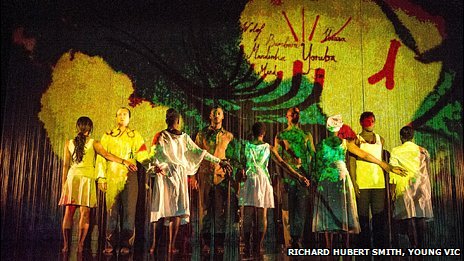Feast, an ambitious and visually striking play that celebrates West Africa’s Yoruba culture and its impact in the Americas and Europe, is showing at the Young Vic theatre in London.

The piece, a co-production with the Royal Court theatre, centres on the journey of four Yoruba deities – through their reincarnations in different black women and men – to Brazil, Cuba, the United States and the United Kingdom, during 300 years, from the times of slavery to the present.
It begins at a crossroads in Nigeria where, on their way to a feast, three sisters – the goddesses or orishas Oshun, Oya and Yemonja – meet a trickster – the ubiquitous Eshu or Elegbara – who warns them that they will be taken away as slaves and indicates that he too is going on the journey.
We next see Yemonja in Brazil, at the time of the abolition of slavery, and in present-day Cuba where she has become, as she calls herself, “a Communist whore”.
Oya and Oshun take part in the 1960s civil rights sit-ins in the US and are later at the centre of discussions on race and identity issues in Barack Obama’s America and in contemporary London.
The stories are the work of five playwrights: Nigeria’s Rotimi Babatunde, Brazil’s Marcos Barbosa, Cuba’s Yunior Garcia Aguilera, American Tanya Barfield and British Gbolahan Obisesan, who was born in Nigeria but moved to the UK as a child.
“It’s been pretty crazy having five writers. One of them lives in London but the rest have not been here through the rehearsal period,” the play’s director, Rufus Norris, told the BBC.
“We all got together on two occasions and I went out to Cuba and to Brazil but, in a way, I’m the sixth writer; they’ve had to trust me to pull it together, to edit, to cut, to move things around,” he added.
Mr Norris says that the idea for the play started in 2007, while the Royal Court’s Elyse Dodgson was running playwriting workshops in Nigeria and Cuba, and she noticed the mutual curiosity that writers had for contemporary practices related to Yoruba beliefs. Something similar had happened to her in Brazil.
Later, when the Royal Court was asked to present a project for last year’s World Stages London festival – organised to coincide with the Olympic Games – playwrights from the UK and the US were invited to join in.
A ‘remarkable journey’
Millions of Africans were forcibly taken from the continent during the transatlantic slave trade, and many of them were Yoruba, one of the largest ethnic groups in West Africa, particularly from present-day southern Nigeria and neighbouring Benin.
“It was great to try to recreate the anxieties, the tensions and the concerns of that era because that was the genesis of a remarkable journey of Yoruba culture from Africa to the Diaspora,” Rotimi Babatunde said.
Mr Babatunde, who last year won the Caine Prize for African Writing, regarded as the continent’s leading literary award, told the BBC that although the play is a memorial to the pains that different generations have passed through, it is also a “celebration of the survival of people from Africa, of a culture which was threatened with extinction not only in Africa but across several countries in the world, so it’s a feast, a festival.”
The Yoruba belief system, Ifa, which has Olodumare or Olorum, the creator of the universe, as its supreme god – assisted by a large number of lesser deities, variously stated as 201 or 401 – had a special impact in places like Brazil and Cuba where it syncretised with Catholicism and flourished, becoming Candomble and Santeria, respectively.
“In Cuba it is difficult to find statistics on Santeria but I think that it is the religion with the most followers,” writer Yunior Garcia Aguilera told BBC Africa.
“My friends and I are not believers but every time we open a bottle of rum we pour a few drops on the ground as an offering to the orishas; my family and I are not believers but, just in case, we keep an image of Eleggua behind the door,” he added.
Eleggua, the holder of the keys to the gates of fate, and his counterpart Echu are the main manifestations in Cuba of Elegbara, the trickster, who has also become Legba in Haiti and the Dominican Republic, Eshu in Trinidad and Tobago, and Exu in Brazil.
Yemonja – who, like Oshun and Oya, is a river deity in Nigeria – is considered the queen of the ocean in Brazil, where she is known as Yemanja, and in Cuba where she is called Yemaya and is the mother of the orishas and of all living beings. So was it not disrespectful to name a Havana prostitute after her?
“No,” the Cuban playwright replies, “in the Yoruba religion, the deities and human beings have a very close relationship. They resemble each other a lot, and sometimes you don’t know who serves whom.
“In Cuba, people who think that they have been waiting for far too long for the orishas to grant them favours threaten them with the withdrawal of their food offerings. ‘You’re going to live on bread and water alone until you do this for me’, they tell the orishas,” Mr Garcia explained.
African connections
World Stages London was meant to be a “once-in-a-lifetime celebration through theatre of the exhilarating diversity of London’s people and culture” and Feast, the final play resulting from the festival, certainly helps it to meet this goal.
It does not only celebrate Yoruba culture; it also offers a glimpse of the many extraordinary artists working in the British capital who are of African descent or have close links to the continent.
Naana Agyei-Ampadu (Oshun), Michelle Asante (Oya) and Kobna Holdbrook-Smith (Elegba) have their roots in Ghana, the family of Noma Dumezweni (Yemaya) hails from South Africa and Louis Mahoney (Papa Legba) is from The Gambia.
African blood also runs in the veins of the main dancers – the UK’s Ira Mandela Siobhan and Coral Messam, and Cuba’s Yanet Fuentes Torres and Alexander Varona – as well as of singer and musical director Michael Henry whose parents are from Jamaica.
Other Feast musicians also have intimate connections with the continent, including Jamiroquai’s percussionist Sola Akingbola, born in the UK to Yoruba parents from Nigeria, and British guitarist Laurence Corns who has worked extensively with Zimbabwean stars Stella Chiweshe, The Bundu Boys and Chartwell Dutiro.
Their efforts are supported and enhanced by Katrina Lindsay’s design, Lysander Ashton’s video work and Havana-based George Cespedes’ powerful choreography, which knit the different stories together.
Towards the end, the piece also pays homage – through the White Man, played by Daniel Cerqueira – to the many non-Africans who have been transformed by their contact with Yoruba religion and have contributed to its understanding, including the likes of Austria’s Susanne Wenger, France’s Pierre Verger, and Cuba’s Lydia Cabrera.
Mr Babatunde told the BBC that he hopes the play will travel to Nigeria soon because although people there have “some awareness” about the importance of Yoruba culture abroad “maybe they don’t understand the magnitude of it”.
“They are aware that Yoruba deities have travelled across the seas but, truly, speaking with my fellow writers on the project I was also really amazed to see the depth of connection they have in those countries with the Yoruba culture.
“It’s extraordinary. This connection that started centuries ago and goes across continents is amazing; it’s a great story which needed to be told and I’m glad I’m part of the team that told the story”.





